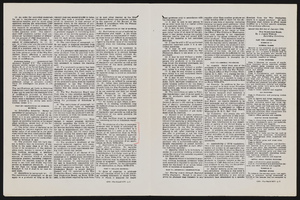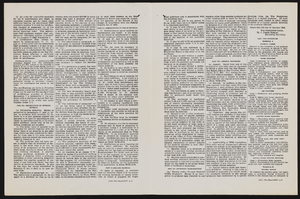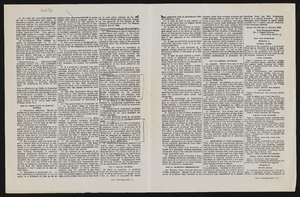Search the Special Collections and Archives Portal
Search Results

Interview with John Frederick Campbell, January 14, 2005
Date
Archival Collection
Description
Text
Lisa Levine (University of Nevada Regent) oral history interview conducted by Magdalena Martinez: transcript
Date
Archival Collection
Description
From the Lincy Institute "Perspectives from the COVID-19 Pandemic" Oral History Project (MS-01178) -- Elected official interviews file.
Text
Shar Rednour and Jackie Strano Papers on S.I.R. Productions
Identifier
Abstract
The Shar Rednour and Jackie Strano Papers on S.I.R. Productions (1981-2015) contain the personal and professional papers of Rednour and Strano, two lesbian filmmakers, writers, and activists from the 1990s until the 2010s. The collection contains the personal papers of both Rednour and Strano, including correspondence between the pair before they married in 2006. The collection also contains the professional files of Rednour and Strano in their capacity as creators of SIR (Sex, Indulgence, and Rock and Roll) Video in 1998. Materials include financial documents, correspondence, scripts and editing notes, crew information, publicity photographs, and direct order forms for S.I.R. Productions. In addition to records on SIR Video, the collection also contains a number of sex-positive and lesbian, gay, bisexual, transgender, and queer (LGBTQ) publications from the LGBTQ scene in San Francisco, California during the 1990s.
Archival Collection
Robert Woodruff Photograph Collection
Identifier
Abstract
The Robert Woodruff Photograph Collection (1900s-1970s) consists of ninety-seven black-and-white photographs of locations and events in Clark County, Nevada. Locations include Las Vegas, Henderson, and Searchlight, Nevada, as well as the Hoover Dam. The majority of the images were taken between 1934 and 1962.
Archival Collection
University of Nevada, Las Vegas School of Nursing Records
Identifier
Abstract
The University of Nevada, Las Vegas School of Nursing Records (1950-2019) contain records documenting the history of the UNLV School of Nursing. The materials include records from the nursing school's Alumni Association, including financial reports, bylaws, correspondence, and membership information; recruitment materials from the School of Nursing, including brochures, photographs, and program requirements; history of the School of Nursing, including photographs, newspaper clippings, a short summary of the program, and a short documentary film comprised of digital video files; and accreditation information, including newspaper articles, accreditation reports, and evaluations of the program from the Nevada State Board. The materials also include nursing student uniforms, caps, and nursing capes from the 1950s and 1960s.
Archival Collection
Six Companies, Inc. Hoover Dam Photograph Collection
Identifier
Abstract
The Six Companies, Inc. Hoover Dam Photograph Collection (1931-1935), consists of approximately 400 black-and-white photographic prints contained in two photograph albums and an additional twenty-one loose black-and-white photographic prints with ten corresponding photographic negatives.
Archival Collection
University of Nevada, Las Vegas Solar Decathlon Records
Identifier
Abstract
The University of Nevada, Las Vegas Solar Decathlon Records (2013-2021) are comprised of records documenting the University of Nevada, Las Vegas's participation in the U.S. Department of Energy (DOE) Solar Decathlon collegiate competition. The collection includes records created by the 2013, 2017, and 2020 UNLV teams (Team Las Vegas) in designing and building their respective competition entries: DesertSol, Sinatra Living, and Mojave Bloom. Records include competition application files, working project files, As-Built submittal packets, and promotional and marketing files for the competition. The majority of records in this collection represent the 2017 competition. Archived websites and social media accounts associated with Team Las Vegas and the Solar Decathlon competition are also included in the collection. The records document Team Las Vegas's efforts in designing and building energy efficient homes for the Solar Decathlon competition.
Archival Collection



